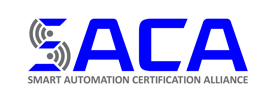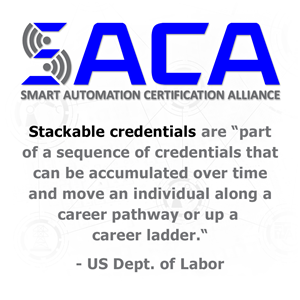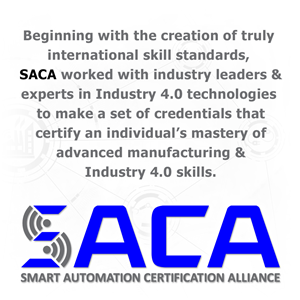Micro-Credentials: The Proof of Knowledge Solution for Industry 4.0
Everyone has taken courses from YouTube University. They encounter car repairs, home projects, or coding errors that they’re unable to fix with their current bank of knowledge, so they search YouTube for videos with intricate explanations and tutorials in order to learn solutions. This act is an informal version of what is referred to as “upskilling” – learning new skills in order to fill a personal knowledge gap in order to accomplish new tasks.
On the other hand, the world is full of people that are well versed in areas that aren’t their profession. Maybe you know an accountant that can repair anything on their car or a math teacher that can install a new electrical outlet in a house.
One thing that these two groups share: no one is going to find them when Google searching “mechanics near me” or “nearby electricians.” When people need a mechanic or an electrician, they want someone with credentials.
Attaining credentials usually involves multi-year degree programs or apprenticeships, which are great for people with no background in a subject. But what’s out there for people that already possess most of the knowledge and skills being taught in those programs? It’s a waste of time and money to send them back to square one because, “that’s how the program works.” And with technological development and adoption speeding up, areas like manufacturing and industry needs something that moves with the speed of change. Enter Micro-Credentials.
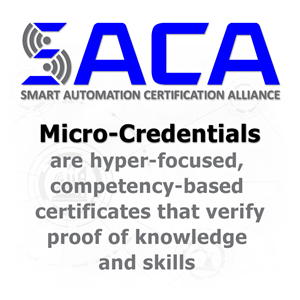
What are Micro-Credentials?
Micro-credentials are hyper-focused, competency-based certificates that verify proof of knowledge and skills. These certificates are meant to supplement degrees and advanced training, not replace them. Basically, micro-credentials do not measure how long you study or how many courses you take; they measure your understanding of a topic and your ability to demonstrate your skill-based competency of the subject. Micro-credentials are also modular, so people can use them to focus on improving skill weaknesses and prove their competency without having to rehash areas that they already know.
What are Stackable Micro-Credentials?
Speaking of modularity, another feature of micro-credentials is that they’re stackable, which is perfect for people in many scenarios. So what’s a stackable credential? As defined by the U.S. Department of Labor, stackable credentials are “part of a sequence of credentials that can be accumulated over time and move an individual along a career pathway or up a career ladder.” So for someone looking to move up the ladder, they can immediately attain credentials for areas where they are already proficient and then continue to add on new credentials as they learn new skills, which will show management a documented interest in continuing education and a commitment to professional growth.
These stackable credentials are also helpful for someone looking to find a new job in the field. They might have years of experience but nothing to verify to a new employer that they are indeed skilled in different areas and disciples. Micro-credentials offer a streamlined way to document someone’s skills without having to start over in a multi-year degree program. Micro-credentials give you immediate credit for things that you already know how to do!
In a third scenario, someone might be downsized from a fading industry and want a fresh start in a new business sector. Micro-credentials provide bite-size documentation of proficiency as this individual builds new skills. If this person wants to enter the manufacturing industry, they could take a handful of foundational courses at a local community college in areas like basic mechanical, basic fluid power, and basic electrical, and then earn corresponding micro-credentials, which would probably be enough to gain an entry-level position. Then the person can continue earning more advanced micro-credentials while they work and learn new skills or take more classes. Eventually, these micro-credentials would stack into an industrial certification that would demonstrate the person’s skill and knowledge to current and future employers across multiple industrial disciplines.
Why are Micro-Credentials Becoming Popular in Manufacturing?
As stated, micro-credentials are important for providing proof of knowledge among any workforce but they are vitally important within the world of manufacturing at the moment because manufacturing is undergoing a new industrial revolution, commonly referred to as Industry 4.0, the Industrial Internet of Things, or Smart Factory. Industry 4.0 takes traditional industrial applications and connects them using wireless internet to produce constant feedback on a variety of metrics including process efficiency, equipment downtime, predictive maintenance tasks, and more!
Employees with years of experience in manufacturing understand the basic technologies, but Industry 4.0 is introducing new technologies and applications that are beyond their scope of knowledge. It doesn’t make sense to start this group over in a bloated training program that begins with basic electrical, mechanical, or fluid power skills. Nor will it make sense for a business to stand still with a workforce that’s not keeping up with new technology as it’s adopted. This is where micro-credentials and SACA can help.
SACA: Certifying the Workforce for Industry 4.0

The Smart Automation Certification Alliance (SACA) is the answer for both education and industry to prove that the manufacturing workforce possesses the necessary skills to be successful in an Industry 4.0 environment. SACA certifications are industry-driven, developed through a rigorous process that begins with truly international skill standards and is endorsed by leading experts in Industry 4.0 technologies throughout the world. SACA’s Smart Automation certifications use a modular structure – including micro-credentials – to enable them to fit a wide range of individual needs, industries, and educational environments. SACA micro-credentials verify that an individual possesses basic industrial skills such as electrical, mechanical, fluid power, rigging, and welding all the way through advanced robot system integration, Industry 4.0 data analytics, and network security.
The world of manufacturing is changing. Gone are the days of dirty, dingy factories. The new shop floor is full of robots, smart components, wireless networks, and Big Data. SACA is the answer to ensuring that the workforce of tomorrow understands these new advances – as well as the basics of industry – and can demonstrate their competency in real-world industrial environments.
- Published in News
SACA: Certifying the Smart Automation Workforce
The evolution of automated technology continues to transform the world’s industrial workplaces in countless ways and there’s no sign of this industrial metamorphosis losing momentum. As Industry 4.0 technology adoption increases, how do companies ensure that potential and current employees have the necessary skills to keep up? Many employers use certifications as a measure of competency, but credentials for Industry 4.0 technology and skills are often tied to specific brands of equipment. But why limit the training spectrum by using a specific brand? How does this make sense when facilities use equipment from multiple brands on their shop floor? What about something more universal, like a certification for job tasks regardless of the equipment used on the manufacturing floor?
The Smart Automation Certification Alliance (SACA), a non-profit organization with the mission to develop and deploy modular Industry 4.0 certifications for a wide range of industries, was founded to aid companies that need employees that are fully versed in cutting-edge Industry 4.0 skills. Working with industry leaders to develop these standards and certifications, SACA built industry-driven credentials with input from companies like FANUC, Rockwell Automation, the Hershey Company, Ashley Furniture Industries, and many others. SACA is also designated as a Standards Recognition Entity (SRE) by the United States Department of Labor.
SACA Certifications: Built for Industry by Industry
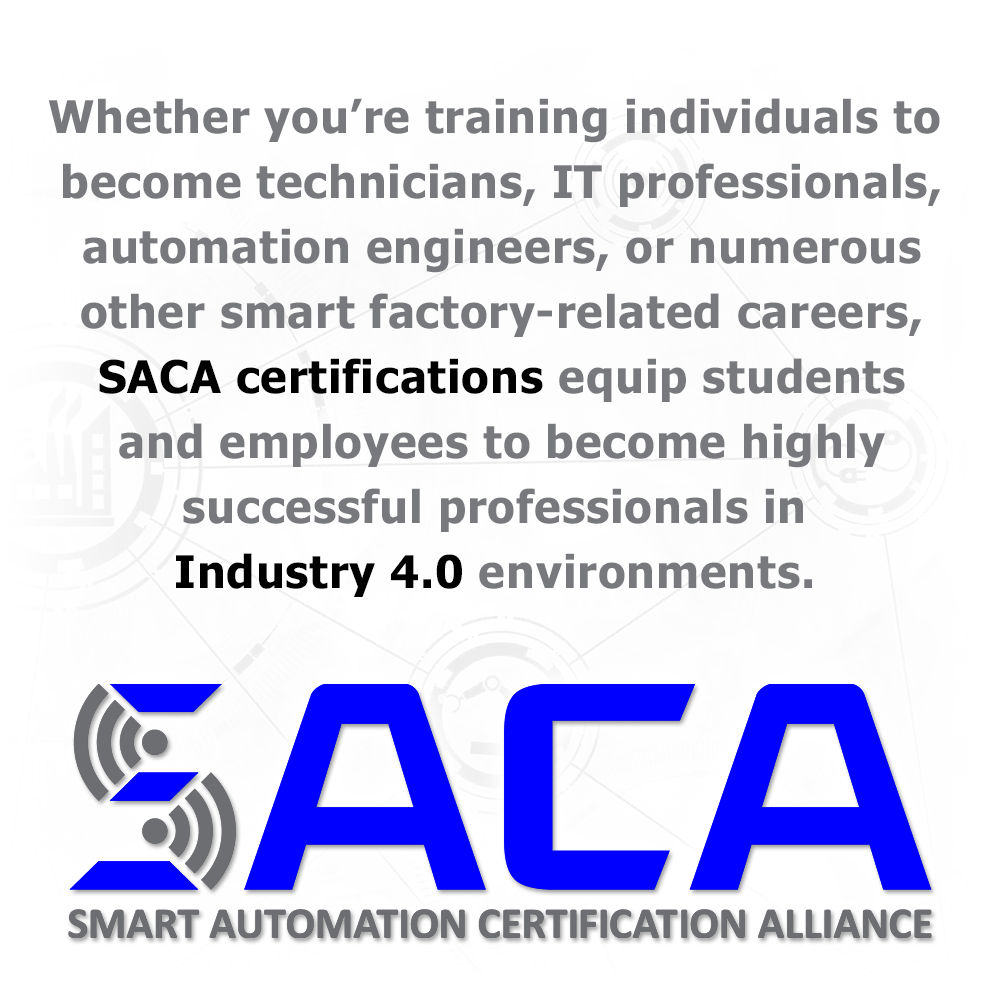
Developing the certifications was a rigorous process. Beginning with the creation of truly international skill standards, SACA worked with industry leaders and experts in Industry 4.0 technologies to make a set of credentials that certify an individual’s mastery of advanced manufacturing and Industry 4.0 job tasks. SACA conducts annual reviews for the certifications ensuring that they remain current as technologies and processes continue to evolve at a rapid pace. By focusing on job tasks and the skills required to perform those tasks, SACA’s certifications give employers assurance when they’re hiring new employees, provide proof of competency for those seeking jobs with companies that have adopted Industry 4.0 technologies, and provide schools and colleges with the confidence that they’re teaching relevant skills.
Who Benefits from SACA Certifications?
Whether you’re training individuals to become technicians, IT professionals, automation engineers, or numerous other smart factory-related careers, SACA certifications equip students and employees to become highly successful professionals in Industry 4.0 environments. SACA offers certifications in three stackable categories: Associate, Specialist, & Professional. These certifications use a modular structure that provides flexibility to fit a wide range of individual needs, industries, and educational environments.
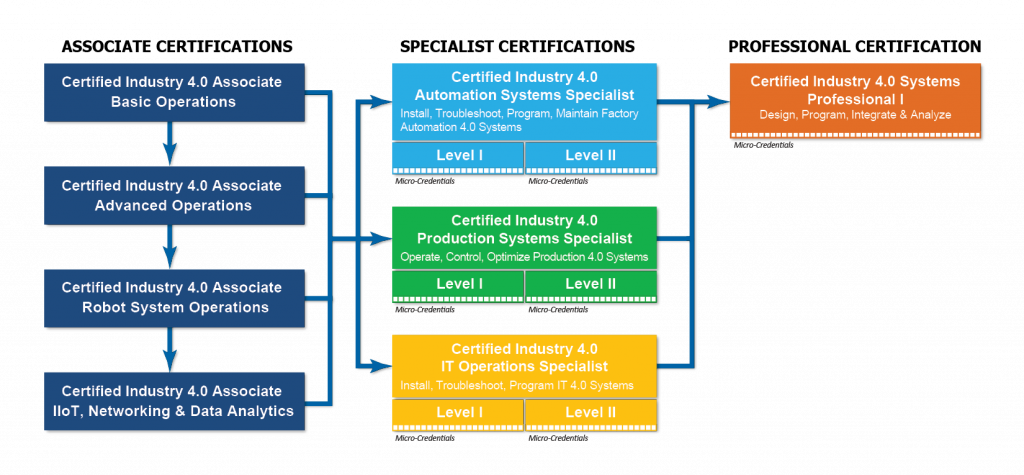
Additionally, the Specialist and Professional-level certifications contain stackable micro-credentials that build upon each other to complete comprehensive certifications. For example, an individual can begin earning micro-credentials for electrical systems, pneumatic systems, robotic operations and many more, which would eventually stack up to SACA’S Certified Industry 4.0 Automation Systems Specialist I credential.
Or companies can use individual micro-credentials to verify that their workforce is up-to-date with the latest technologies and skills to close any skill gaps that already exist. With so many choices in micro-credentials, individuals can quickly transform into versatile team members that can help with a variety of smart factory applications.
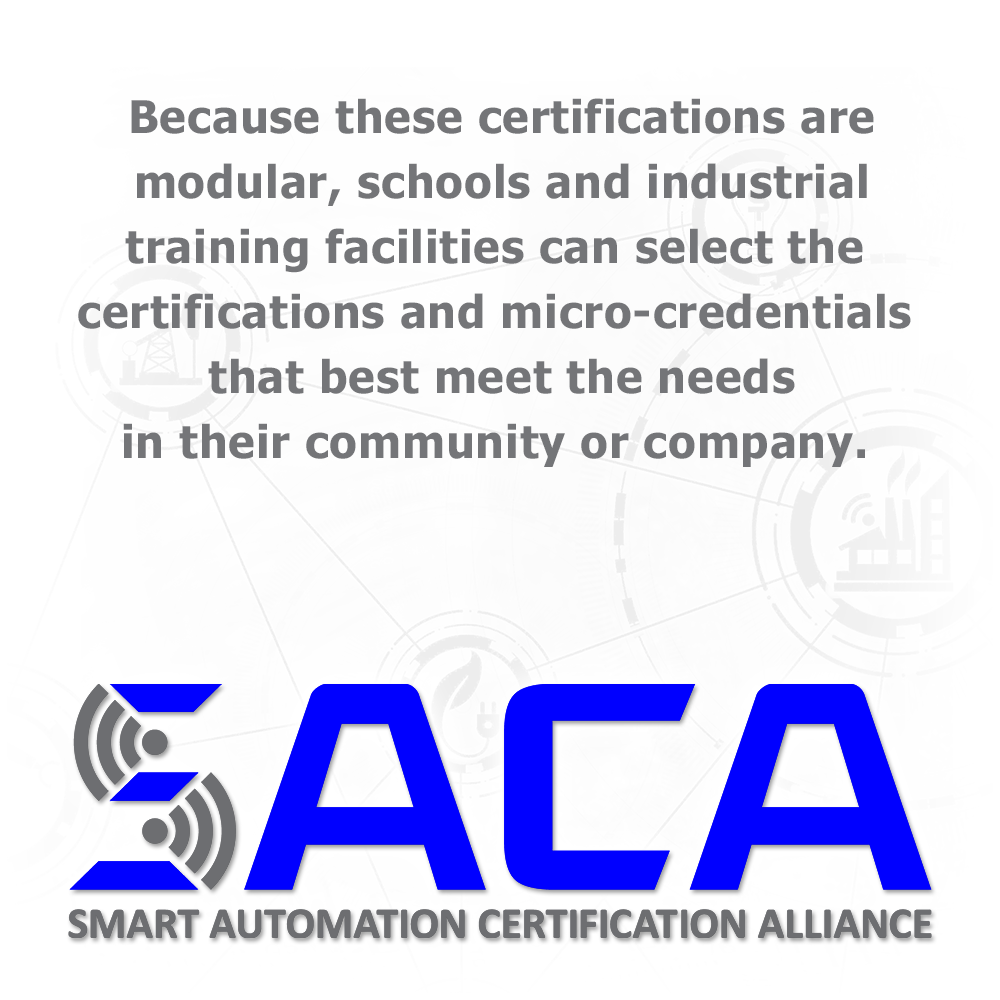
Because these certifications are modular, schools and industrial training facilities can select the certifications and micro-credentials that best meet the needs in their community or company. In many cases, there’s no need to purchase additional training equipment to prepare for the certifications. Many of the skills and micro-credentials from SACA rely on equipment schools or training centers may already have.
How Can Someone Get a SACA Certification?
To attain SACA certifications, individuals must be employees or students of a SACA member institution. Individuals can prepare for the online examination using any text, online courses, or other means that align with the standards. Individuals passing the written examination receive a Silver Credential. Individuals can also demonstrate hands-on competencies on industrial-grade equipment that they’ll see in the workplace. If someone passes both the written and hands-on examinations, they will receive a SACA Gold-level Credential.
SACA certification examinations and hands-on testing are performed at SACA Authorized Testing Centers. Organizations can become a testing center by becoming a SACA member.
How Do I Become a SACA Member? What Are the Benefits of SACA Membership?
SACA offers membership for both educational institutions and industry, so professionals representing those organizations that are interested in membership can reach out to SACA on SACA.org. Educational memberships for high schools and colleges enable these institutions to become authorized certification centers, deliver free certifications to students, and stay informed about the latest developments in Industry 4.0 technology. Companies get all of the aforementioned benefits of educational memberships with additional incentives unlocked by different levels of industry membership. For instance, companies that are Silver Members and above will have a portion of their membership fee designated for named scholarships to sponsor educational institutions and teachers starting new Industry 4.0 certification programs.
Contact SACA Today to Learn More
Industry 4.0 is here and being rapidly adopted by companies around the globe. If students, employees, and companies aren’t preparing and keeping up with this wave of big data, they’ll get swept away by the competition. SACA can help all of the above to adapt and prepare for success. Fill out a contact form to learn how to join SACA, where to find testing sites, and how to get certifications in the hands of your students and employees.
- Published in News
